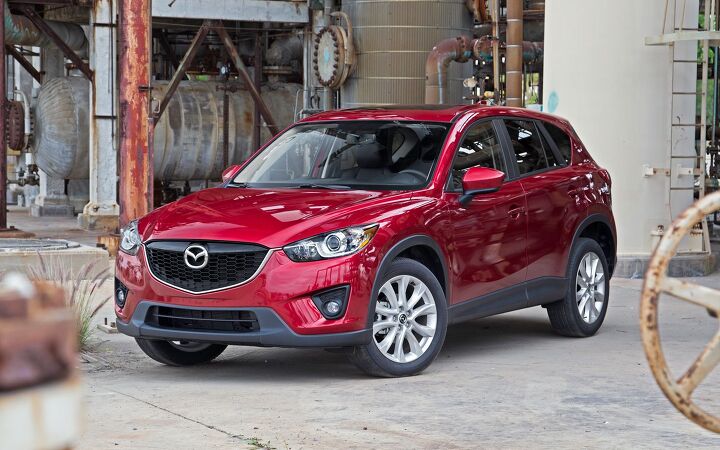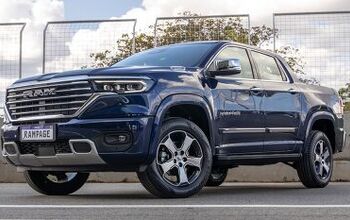Japan Develops Oil-Burning Desire. A Bonsai Sized One

There probably is no other major car market where oil-burners play less of a role than in Japan. Even diesel-averse Americans buy more. Excitement about brown diesel wagons notwithstanding, diesel-powered cars limp along at around 3 percent market share in America. In Japan, where diesel-powered cars were banned from the streets of Tokyo 14 years ago, and where they carry the onus of being smelly, their market share is below miniature one percent. In both markets, there are hopes for a big diesel turn-around.
In America, most of diesel’s featherweight is carried by Volkswagen which just doesn’t want to understand why diesels won’t sell in European quantities, where every other new car bought is a diesel. In Japan, Mazda bets big on diesel.
Mazda sells diesel versions of the CX-5 SUV in Japan, and also of the Mazda6, called the Atenza in the Nipponese market. Says The Nikkei [sub]:
“Their success encouraged Mazda to also equip its smaller cars with diesel engines. This year the company will add a diesel version of its fully remodeled Axela — sold overseas as the Mazda3 — and in 2014 will offer a diesel version of the fully remodeled Demio. The Axela will initially be equipped with a 2.2-liter diesel engine, but Mazda is developing a 1.5-liter engine that it plans to use for both the Axela and the Demio.”
The Demio is better known outside of Japan as the Mazda2.
Mitsubishi is planning to offer diesel-powered vehicles in Japan. Volvo will release a diesel car this year, and Germany’s Volkswagen plans to introduce a model in or after 2014. In addition, both Daimler and BMW plan to bring more diesel cars to the island nation.
Says the Nikkei:
“By 2014 at least 10 different models of diesel cars will be available, or double the present number. Overall annual sales, stuck below 10,000 units in fiscal 2011, are predicted to balloon to 200,000 to 300,000 units.”
Assuming the Japanese market remain what it was in 2012, this would be a take rate between 5 and 7.5 percent.

Bertel Schmitt comes back to journalism after taking a 35 year break in advertising and marketing. He ran and owned advertising agencies in Duesseldorf, Germany, and New York City. Volkswagen A.G. was Bertel's most important corporate account. Schmitt's advertising and marketing career touched many corners of the industry with a special focus on automotive products and services. Since 2004, he lives in Japan and China with his wife <a href="http://www.tomokoandbertel.com"> Tomoko </a>. Bertel Schmitt is a founding board member of the <a href="http://www.offshoresuperseries.com"> Offshore Super Series </a>, an American offshore powerboat racing organization. He is co-owner of the racing team Typhoon.
More by Bertel Schmitt
Latest Car Reviews
Read moreLatest Product Reviews
Read moreRecent Comments
- Lou_BC Hard pass
- TheEndlessEnigma These cars were bought and hooned. This is a bomb waiting to go off in an owner's driveway.
- Kwik_Shift_Pro4X Thankfully I don't have to deal with GDI issues in my Frontier. These cleaners should do well for me if I win.
- Theflyersfan Serious answer time...Honda used to stand for excellence in auto engineering. Their first main claim to fame was the CVCC (we don't need a catalytic converter!) engine and it sent from there. Their suspensions, their VTEC engines, slick manual transmissions, even a stowing minivan seat, all theirs. But I think they've been coasting a bit lately. Yes, the Civic Type-R has a powerful small engine, but the Honda of old would have found a way to get more revs out of it and make it feel like an i-VTEC engine of old instead of any old turbo engine that can be found in a multitude of performance small cars. Their 1.5L turbo-4...well...have they ever figured out the oil dilution problems? Very un-Honda-like. Paint issues that still linger. Cheaper feeling interior trim. All things that fly in the face of what Honda once was. The only thing that they seem to have kept have been the sales staff that treat you with utter contempt for daring to walk into their inner sanctum and wanting a deal on something that isn't a bare-bones CR-V. So Honda, beat the rest of your Japanese and Korean rivals, and plug-in hybridize everything. If you want a relatively (in an engineering way) easy way to get ahead of the curve, raise the CAFE score, and have a major point to advertise, and be able to sell to those who can't plug in easily, sell them on something that will get, for example, 35% better mileage, plug in when you get a chance, and drives like a Honda. Bring back some of the engineering skills that Honda once stood for. And then start introducing a portfolio of EVs once people are more comfortable with the idea of plugging in. People seeing that they can easily use an EV for their daily errands with the gas engine never starting will eventually sell them on a future EV because that range anxiety will be lessened. The all EV leap is still a bridge too far, especially as recent sales numbers have shown. Baby steps. That's how you win people over.
- Theflyersfan If this saves (or delays) an expensive carbon brushing off of the valves down the road, I'll take a case. I understand that can be a very expensive bit of scheduled maintenance.


































Comments
Join the conversation
The only new car my father owned was a 1955 Mercedes 180D he picked up at the factory while stationed in Berlin with the US Army. To hear my mother tell the tales, finding fuel in the States after his return was a real experience. I can't afford a MB or BMW. I would love to own a small diesel econobox. I frequently go on several-hundred mile drives. The problem is that as far as I know, my options in the US are limited to Volkswagen. Their spotty reliability and the negative experiences with their service department expressed by members of this site, and of Volkswagen-centered sites doesn't encourage me in that direction. Having a High-Pressure Fuel Pump fail off the beaten track in west-Texas or rural Oklahoma would be unpleasant. Apparently the other options (CX-5 above) are not much better.
Diesels have alot of hidden quirky issues - its not just that they don't do great in cold weather. But they don't produce alot of heat - so your car doesn't warm up fast when its cold. People claim the engines have alot of torque - but its an extremely narrow power band compared to a big gas engine or an even a modern turbo charged gas engine. Compare the power output of a 320d with a 328i (BWM) Both use 2.0l engines but the gas one is far more flexible coming on powerwise a touch earlier but producing power at a much wider range of RPM (the gasoline one). If you look at the dyno the gasoline engine is clearly better. Electrics will still produce power at high RPMs - its just that its way down. At about 6k they start producing so much less torque that power output falls. Even so they can function just fine driving round in the equivalent of 2nd gear all the time. Though the top speed suffers of course.